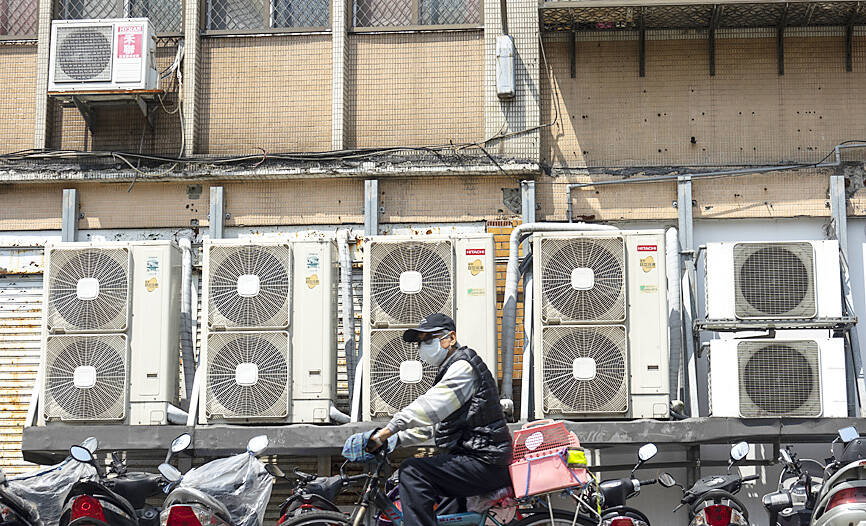Environmental groups yesterday voiced qualified support for an increase in electricity rates, saying that a price hike could boost the energy efficiency of Taiwanese industries and help them achieve net zero carbon emissions by 2050.
Electricity rates must reflect real energy costs, a coalition of 12 groups — including the Green Citizens’ Action Alliance, Citizens of the Earth, Taiwan, and the Taiwan Climate Action Network — said in a joint statement before the government announced rate hikes later in the day.
Taiwan Power Co (Taipower) earlier that day started the review process for a proposed 15 percent increase in industrial electricity prices and a 10 percent increase in residential electricity prices.

Photo: CNA
Taipower has incurred accumulated losses of NT$380 billion (US$11.89 billion) in the past two years, due largely to soaring gas and oil prices amid Russia’s ongoing invasion of Ukraine, they said.
The International Energy Agency in 2022 reported that the various forms of subsidies Taiwan provided related to fossil energy were worth five times more than the previous year.
A continued failure to adjust electricity prices in these circumstances would negatively affect Taiwan’s push to reach net zero emmissions, its fight against air pollution and the financial viability of Taipower, the groups added.
“Certain individuals have repeatedly made misleading statements that blame the anti-nuclear power movement and renewables for the [proposed] electricity rate hike,” they said. “These statements misguide the public and prevent constructive policy discussions.”
Claims from Taiwanese industries that increased electricity rates would cause them to relocate are exaggerated, as Taiwan boasted the world’s third-lowest industrial electricity prices in 2022, behind South Korea and China, they said.
Electric bills account for just 2.1 percent of the Taiwanese manufacturing sector’s total business expenditures, meaning the proposed hike would increase production costs by 0.9 percent, the groups added.
“We urge large enterprises to review and improve the energy efficiency of their operations instead of obsessing over electricity prices, which would contribute to Taiwan’s transformation to a net zero economy,” they said.
The government should be prepared to deal with the effects of higher residential electricity costs on low-income families and the price of necessities, and strengthen progressive electricity purchasing to counter inequality, the groups said.
Subsidies for energy-efficient household appliances, smart electricity meters and heat-regulating architecture should be utilized to change the public’s energy consumption patterns, they added.

Chinese Nationalist Party (KMT) Chairman Eric Chu (朱立倫), spokeswoman Yang Chih-yu (楊智伃) and Legislator Hsieh Lung-chieh (謝龍介) would be summoned by police for questioning for leading an illegal assembly on Thursday evening last week, Minister of the Interior Liu Shyh-fang (劉世芳) said today. The three KMT officials led an assembly outside the Taipei City Prosecutors’ Office, a restricted area where public assembly is not allowed, protesting the questioning of several KMT staff and searches of KMT headquarters and offices in a recall petition forgery case. Chu, Yang and Hsieh are all suspected of contravening the Assembly and Parade Act (集會遊行法) by holding

PRAISE: Japanese visitor Takashi Kubota said the Taiwanese temple architecture images showcased in the AI Art Gallery were the most impressive displays he saw Taiwan does not have an official pavilion at the World Expo in Osaka, Japan, because of its diplomatic predicament, but the government-backed Tech World pavilion is drawing interest with its unique recreations of works by Taiwanese artists. The pavilion features an artificial intelligence (AI)-based art gallery showcasing works of famous Taiwanese artists from the Japanese colonial period using innovative technologies. Among its main simulated displays are Eastern gouache paintings by Chen Chin (陳進), Lin Yu-shan (林玉山) and Kuo Hsueh-hu (郭雪湖), who were the three young Taiwanese painters selected for the East Asian Painting exhibition in 1927. Gouache is a water-based

Taiwan would welcome the return of Honduras as a diplomatic ally if its next president decides to make such a move, Minister of Foreign Affairs Lin Chia-lung (林佳龍) said yesterday. “Of course, we would welcome Honduras if they want to restore diplomatic ties with Taiwan after their elections,” Lin said at a meeting of the legislature’s Foreign Affairs and National Defense Committee, when asked to comment on statements made by two of the three Honduran presidential candidates during the presidential campaign in the Central American country. Taiwan is paying close attention to the region as a whole in the wake of a

OFF-TARGET: More than 30,000 participants were expected to take part in the Games next month, but only 6,550 foreign and 19,400 Taiwanese athletes have registered Taipei city councilors yesterday blasted the organizers of next month’s World Masters Games over sudden timetable and venue changes, which they said have caused thousands of participants to back out of the international sporting event, among other organizational issues. They also cited visa delays and political interference by China as reasons many foreign athletes are requesting refunds for the event, to be held from May 17 to 30. Jointly organized by the Taipei and New Taipei City governments, the games have been rocked by numerous controversies since preparations began in 2020. Taipei City Councilor Lin Yen-feng (林延鳳) said yesterday that new measures by